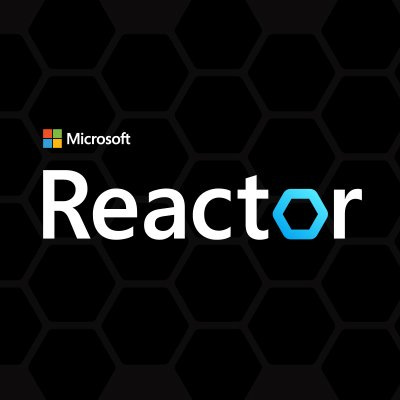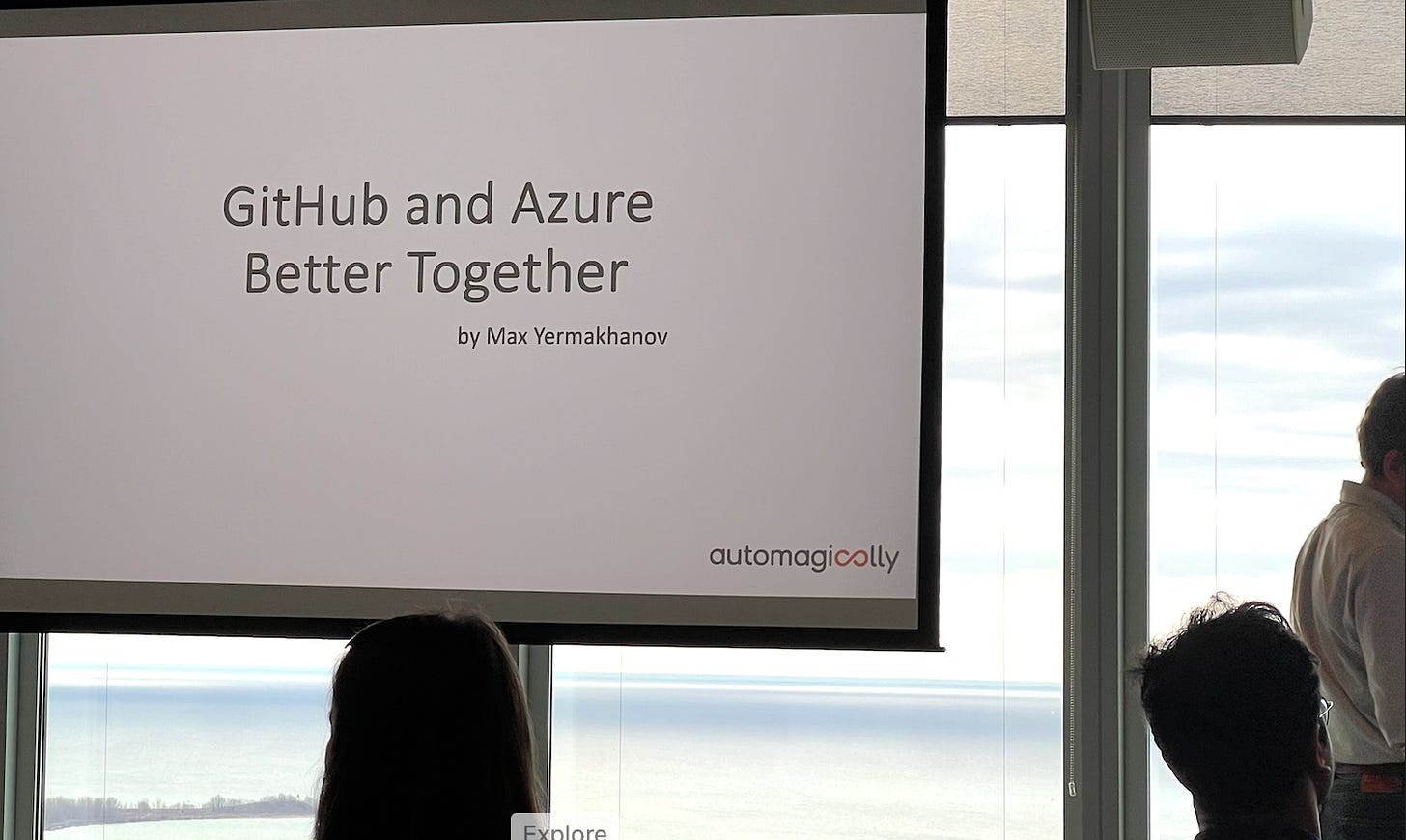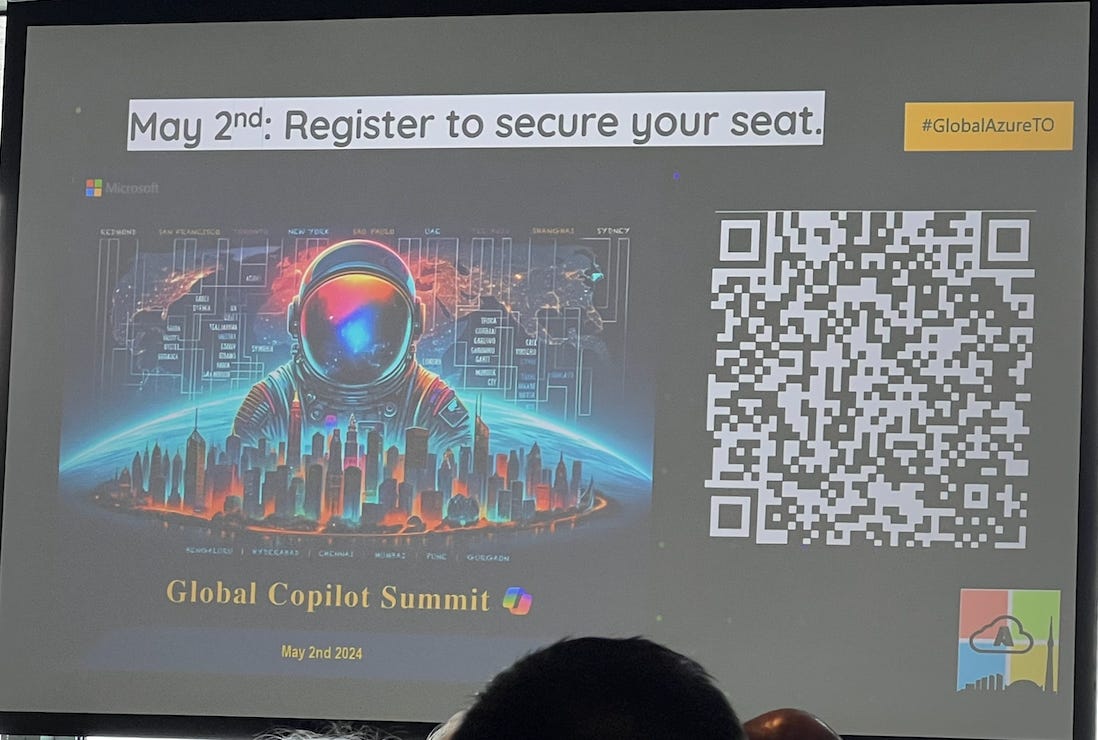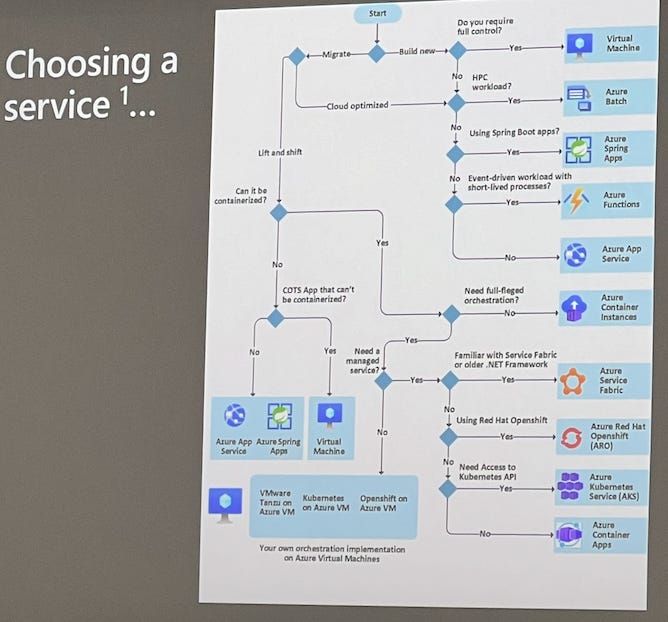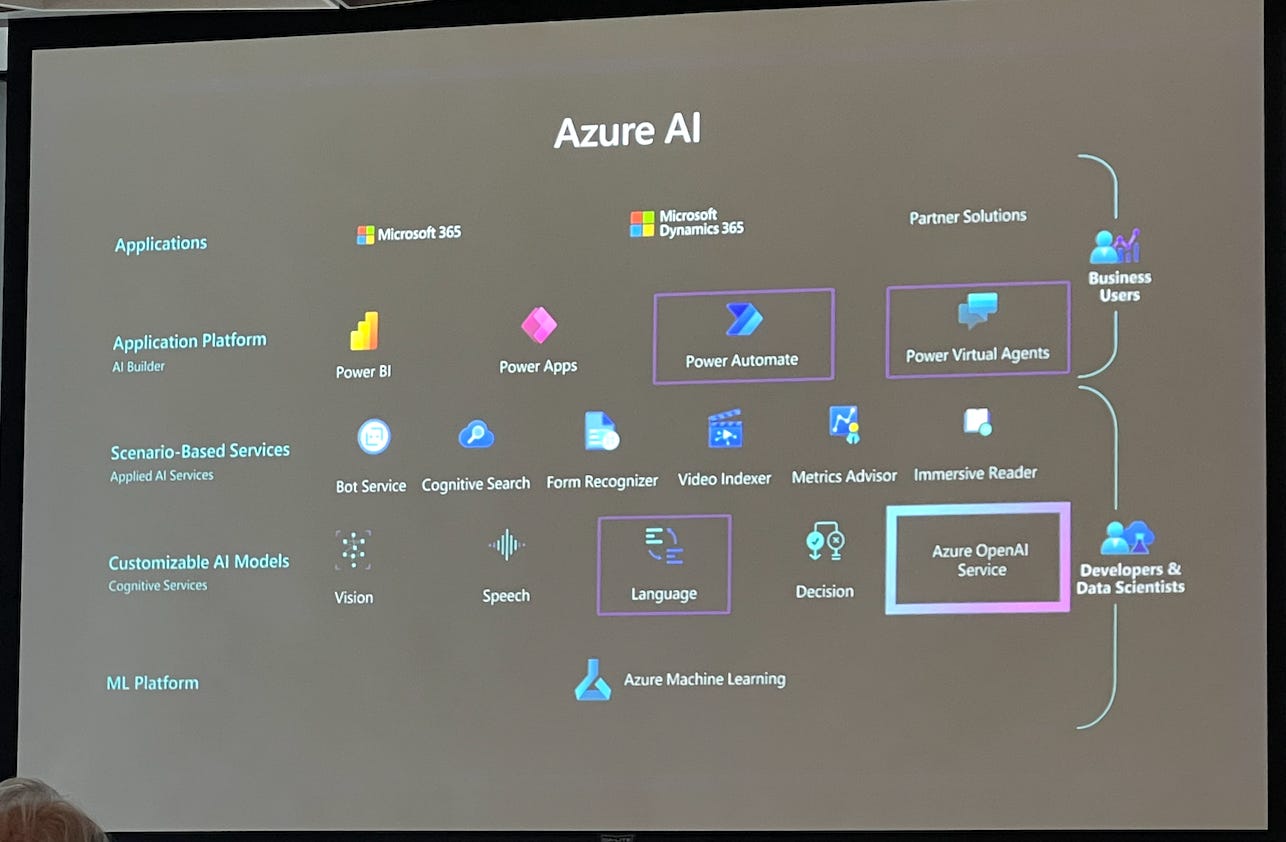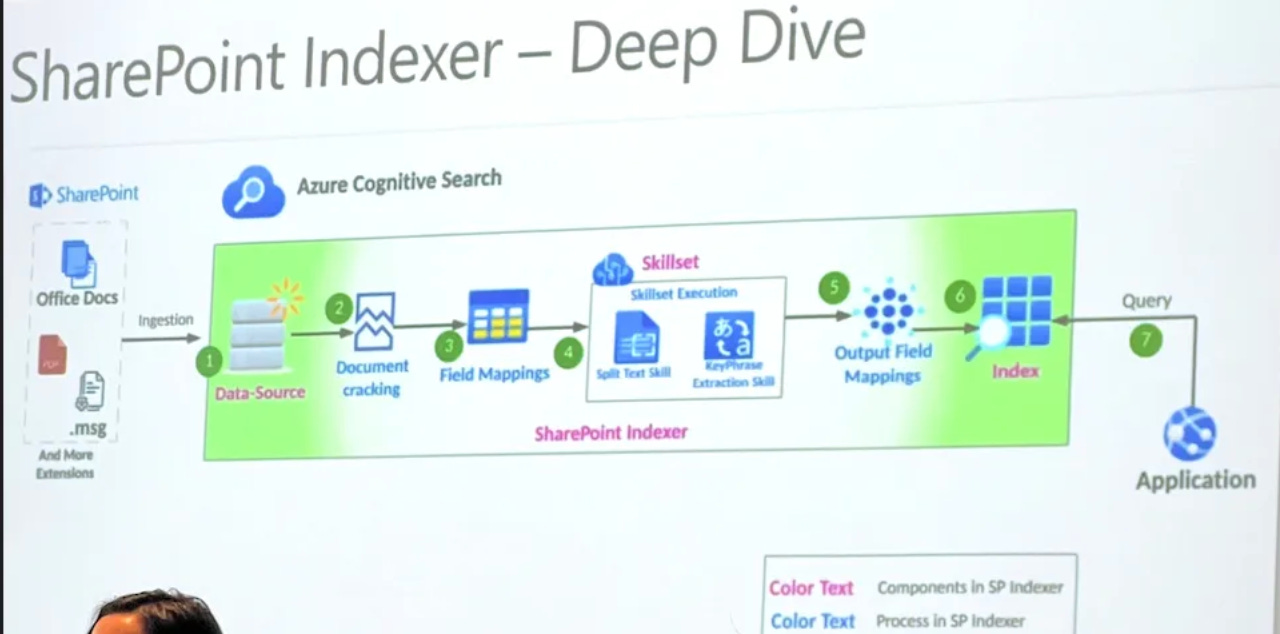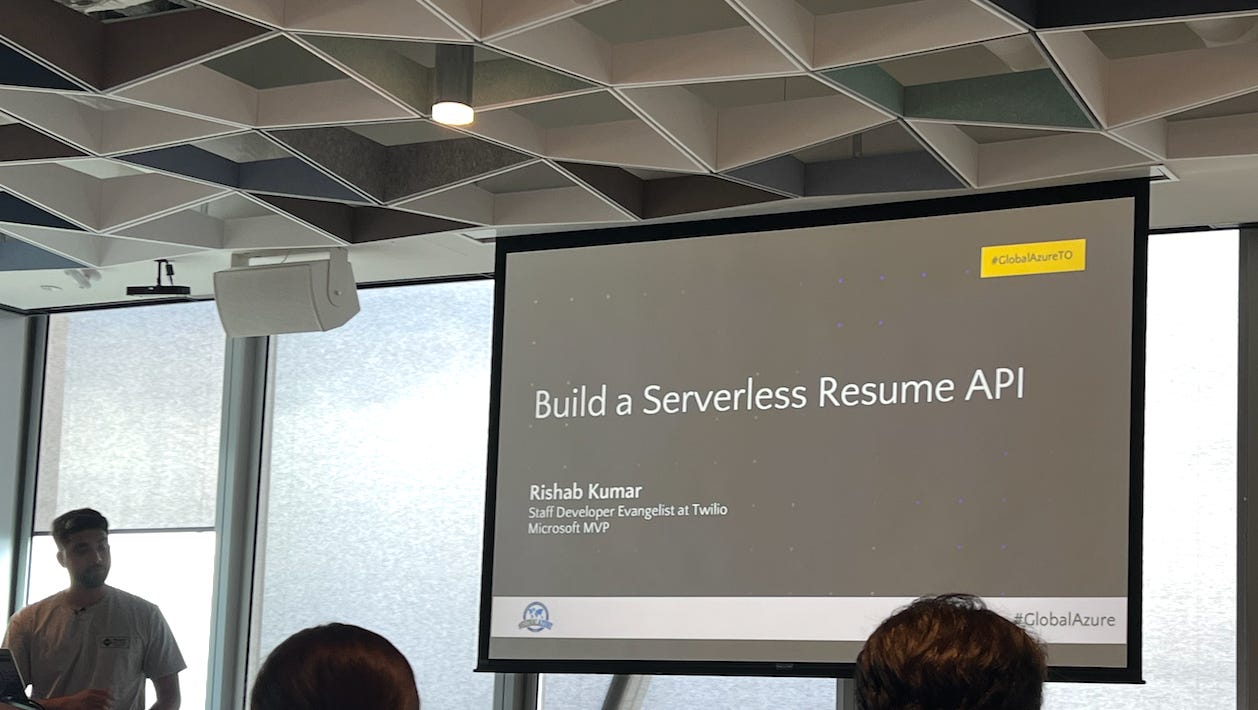Global Azure Bootcamp April 2024 - Microsoft Reactor - Toronto
A few highlights from the Bootcamp session at Microsoft on the Azure ecosystem with a large focus on AI and how it will be impacting and assisting all areas.
I was lucky to be one of the few people that attended the Microsoft Reactor Global Azure Bootcamp 2024 full day event in Toronto recently.
It was held at the Microsoft HQ in Downtown Toronto on the 43rd floor of the CIBC building and the view alone was amazing. For those of you who have not been able to visit the Microsoft head office, they have an amazing view of Toronto from all angles of the building, so great views wherever you look.
The Microsoft Reactor team regularly host their events here and they do an amazing job! They bring Microsoft MVP’s and many variously talented speakers to talk at their events to share their knowledge with the community. Even though this was a Saturday event there was quite a turn up of people from all over Toronto and the world with volumes of experience.
It’s great when visiting the head office as in preparation for the events, you’re issued a day pass as a QR code to your phone that you scan at the entry gates and it tells you which lift to take you up to their office… I know, super fancy 😂.
We began with the intro presentation and discussion of the day’s plan which entailed 3 seperate tracks occurring at the same time, which was great! As you could pick and choose which sessions to go and watch, the only issue was I couldn’t make it to all of them 😓.
The Days Tracks
As I mentioned before, the sessions were broken up into different rooms and tracks of what to watch and listen to, each presentation had potential, but alas, I had to choose which sessions I wanted to attend. The full list of the tracks were:
The sessions were:
9:30 - 10:30
Unlocking Insights: Azure Cognitive Search and Document Intelligence Integration by Krishna Venkat
GitHub & Azure: Better Together by Max Yermakhanov
Build intelligent apps with Semantic Kernel by Pooyan Fekrati
10:30 - 11:30
Azure OpenAl tool choice with Azure functions by Alex Pshul
Not ready for Kubernetes? No problem. Here are some alternatives for your containers by Ricardo Covo
Modern Data Engineering in Microsoft Fabric by Ashraf Ghonaim
11:30 - 12:30
Introduction to Machine Learning and Generative Al by Eli Robillard
Secure and enhance your Azure OpenAl deployment with API Management by Ehsan Eskandari
Al Power - Power Platform, Copilot and Azure Open Ai by Alex Rostan
12:30 - 1:30 - LUNCH
1:30 - 230
Exploring Kaito an operator streamlining Al inference model deployment in Azure Kubernetes Service by Roy Kim
From On-Premises to Azure Cloud: .NET Web App Journey by Callon Campbell
Azure Open Al integration with SharePoint by Nehal Bhandari and Alex Rostan
2:30 - 3:30
Modern Cyber Warfare: The Rise of Al Hacking and Azure Al Defense Tools by Hisham Qaddoumi
Empowering Future Development: An Introduction to the .NET Aspire by Tamir AlBalkhi
Build a Serverless Resume API: A Hands-On Guide by Rishab Kumar
My Chosen Path
Ok, so there were some good options, but inevitably I had to make a choice and work out which path I’d pave through today’s event.
Well, I love source control and Git and I love GitHub! I think it’s amazing and what you can do with it is phenomenal, so for the first presentation I went with…
GitHub & Azure: Better Together by Max Yermakhanov
I’ve seen Max present on the benefits of GitHub before and he always enjoys to have his audience dove in with questions as he’s talking. I have a feeling he likes to be put on the spot with questions and answer what he can on the fly.
The talk was quite informative on how businesses can focus on both Azure and GitHub together, with the key focus for developers as having GitHub as the prime source and for others running off Azure and DevOps.
It was demonstrated how they could both be linked together so that GitHub could connect to Azure DevOps and they could communicate various items, such as secure resources, profiles, OpenID linking examples for credentials and security, etc.
It was good to see that they could both be used to compliment each other and that they both had features that the other did not fully focus on and Max did a good job at presenting and explaining the situations where it would be beneficial to migrate to GitHub for repositories and be beneficial for developers, as well as when it wouldn’t.
Max did also mention the Copilot Summit in May 2nd as well, I’ll be attending :)
Not ready for Kubernetes? No problem. Here are some alternatives for your containers by Ricardo Covo
Ricardo was the next speaker I wanted to listen to as Kubernetes is the buzz word of things going on at the moment for orchestration and managing all your organisational resources and systems.
He discussed in depth various Azure resources such as using scalable Web App services as well as the Container Apps, Container Jobs and Container Instances that was quite interesting and how they could be spun up and down as required with resources.
It was also discussed when Kubernetes usage could be overkill in particular scenarios, which was great to give clarity that even though it’s something that various companies and organisations are wanting to lean towards, there are some that are moving away from it.
Al Power - Power Platform, Copilot and Azure Open Ai by Alex Rostan
And then last before lunch was the Power Platform and Copilot talk that Alex gave. This was quite interesting for me as I haven’t had a change to look at any of the Power Platform applications before.
It was amazing to see the demonstration that he was able to do to create a Power App using copilot, and within a single sentence, asked it to create an application that managed materials for a dummy building company.
It was able to add materials, remove them and also Alex demonstrated create a database and linking the data to the application simply by using copilot to ask the questions and generate what was needed.
I found this quite interesting, he did mention that to get down to the nitty gritty calculation bits and to be exact, it did require developers to still go into the code and edit parts of it, but it was still qute impressive to what it could do with just asking copilot questions and it generating an application based on the requests.
But it does look like it can leads to a big chunk of spending when using it.
LUNCH TIME
Yay for lunch! Microsoft reactor provided pizzas and drinks for lunch and it was a good time to mingle with people and admire the view around at the same time.
I wouldn’t mind an office up this high with a view like this at all! 😍
Azure Open Al integration with SharePoint by Nehal Bhandari and Alex Rostan
Next was the SharePoint talk by Nehal, who discussed setting up a SharePoint environment and using mapping and Skillsets to allow for AI to generate, load and create indexing for your documents and resources.
The talk discussed the initial setup of a Sharepoint resource and went into using Postman to create and build the indexing and mapping of the resources to be used and searched for a data source that linked to a chat app. The application was a developer version of a chatGPT service, that was a chatbot and allowed to reference resources within a Sharepoint and reference as well as create links to it’s data.
resource here: https://github.com/Azure-Samples/azure-search-openai-demo
Needed to change the and point to a SharePoint indexer instead of the azure indexer to work with Sharepoint data. It was quite informative and a good demo to display the information and links being generated within a chat and pointing to the pre-assigned Sharepoint data source.
Build a Serverless Resume API: A Hands-On Guide by Rishab Kumar
And for the final talk I attended for the day, I attended Rishab’s presentation on serverless. This was a big focus on creating website API’s using the Azure Functions resources that allowed to deploy functioning api endpoints and code that would listen and respond to triggers and requests made to it and then run logic in order to return a response to the client.
This was a great demonstration on how you can create API’s and endpoints without requiring an application running on a server, with just functions and endpoints sitting and only being charged for what they are using.
However, even though there were some high positive points, there were some not so positive points, such as the cold starts for example. If the function’s not running and up, then it can take some time for it to start up and run the logic, which means a wait time for the client.
The other point that was made was that it can scale and if it’s used alot and scales up as is potentially required if something becomes popular, the charges for usage can also go up, so that also needs to be accounted for. But that said, being able to launch and trigger API’s without the overhead of managing a server is quite handy for developers who don’t want the hassle of server and upgrade maintenance for their systems.
Summary
It was a great day of information and great views of the city! I would highly recommend jumping on the Microsoft Reactor group and participating in one or more of their meetups. Everyone’s super friendly and eager to share their knowledge and meet others who have similar interests.
I met a few people and even broke the ice by talking about the view.
It would have been great to watch all the tracks and presentations, but what I saw was great and everyone did a great job presenting and organising the event!
Thanks Microsoft Reactor team and will catch you again soon!



